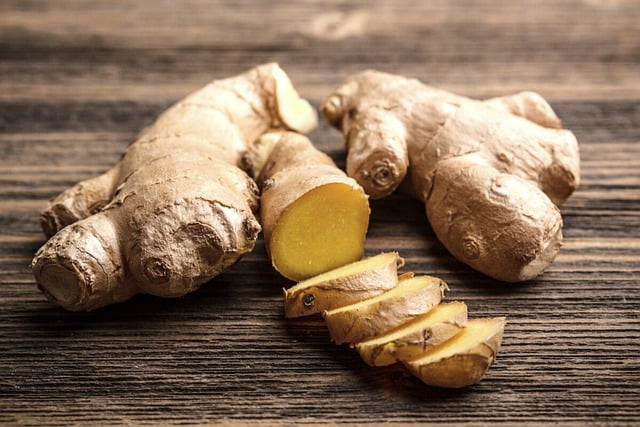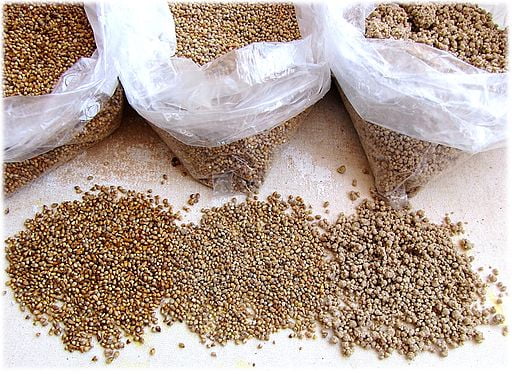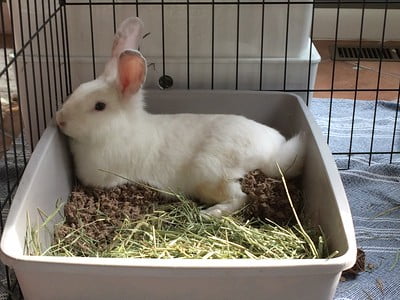Last Updated on February 27, 2023 by Marjon Ramos
Quick Facts About Ginger:
- Scientific name – Zingiber officinale
- Origin – Southeast Asia, India and China
- Most commonly found in – China
- Average weight – 28.3 grams
While its true that ginger is not poisonous to rabbits, you should still refrain from feeding it to your rabbit because it provides little to no benefit to them.
There are other foods that’s more beneficial to your rabbit than gingers that should take priority in their diet.
Also, gingers can easily be mistaken by other root vegetables that might be poisonous to rabbits like wild ginger.
Finally, most rabbits would likely not eat gingers because it has a strong and spicy taste and smell.
Now that I’ve given you the gist of the article, read on as I explain in more detail if your rabbit can eat ginger:
Table of Contents
Do rabbits like to eat ginger?
Some rabbits would eat ginger while others would get repulsed by its strong spicy smell. But there are rabbit breeders that reported to feeding gingers to their male rabbits to improve breeding:
I can’t remember how it was said but is supposed to improve bucks for breeding. I did give my boys some ginger root in January and in no time (about a week) they were interested in breeding. They should recieve a piece about the size of a quarter daily. The older 9 bunnies we have now are the ginger bunnies
AmysMacdog
In my case, I did try to test if my rabbits would eat ginger, both of them (Tyr and Freya), are repulsed by the smell of ginger.
Is ginger safe to be eaten by rabbits?
Ginger is safe to be eaten by rabbits as long as its only on rare occasions. You should basically treat gingers as a treat and only give them a little bit.
Be careful when feeding ginger or parts of ginger (leaves, plants, stalks, roots, etc.) to your rabbits because there are plants that are toxic to rabbits that can resemble gingers.
What are the benefits of feeding ginger to rabbits?
To properly understand the benefits of feeding ginger to your rabbits, let’s first take a look at their nutritional content and whether or not it’s within the nutritional constraints for rabbits.
You can use this nutritional constraint calculator for rabbits to see how many nutrients a ginger has and whether or not it’s within the nutritional constraint.
You can also click on the blue icon beside the nutrient to see the benefits and deficiency of each nutrient:
Nutrient Constrain Calculator For Rabbits
Warning
Although ginger has these benefits, overfeeding your rabbit is not recommended. This is only to inform you of the different vitamins and minerals your rabbit can get when you give them ginger.
As you can see from the nutrient constrain calculator above, ginger are within the nutritional constrain as long as you only feed them in small amounts.
Is ginger good for rabbits?
Ginger actually contain very little of the nutrients. But as an occasional treat, it’s okay.
You should never rely on treats to meet any nutritional requirements, because doing so could lead to digestive problems because treats could never meet your rabbit’s fiber requirements.
How much ginger can a rabbit eat?
The amount of treats (ginger) you should give your rabbits would depend on their age and weight.
You can use this diet portion calculator for rabbits to determine if your rabbit is old enough to eat ginger (treats) or how many treats to give based on your rabbit’s weight:
Diet Portion Calculator For Rabbits
If you don’t know your rabbit’s weight, here’s the average weight of each rabbit breed and how much ginger to give based on their weight:
| Rabbit’s weight based on breed | Allowed ginger two times per week |
|---|---|
| Small breed (1.1–3.5 pounds) | 1 teaspoon |
| Medium breed (6 to 10 pounds) | 1-2 tablespoon |
| Large breed ( 9 and 12 pounds) | 2-3 tablespoon |
When can rabbits start eating ginger?
The table above assumes that your rabbit is at least 7 months old.
Another important factor when deciding how much ginger to give your rabbits is their age.
Here’s a table that shows how much ginger to give based on your rabbit’s age:
| Age | Fruits |
|---|---|
| 7 weeks to 7 months | — |
| 7 months to 1 year | No more than 1-2 oz (30-60g) per 6 lbs (2.7 kg) BW |
| Adult (1-5 y) | No more than 2 tbsp per 6 lbs (2.7 kg) BW |
| Seniors (>6 y) |
When should you not feed ginger to rabbits?

Gist:
Stop giving treats like ginger to rabbits that are having digestive problems.
If you suspect that your rabbit might be having digestive problems, stop giving any kinds of treats.
The proper protocol whenever you notice any changes in your rabbits poop or behavior (signs of digestive problem) is to only feed them hay and bring your rabbit to a veterinarian.
Feeding a lot of hay and stopping treats would ensure that your rabbit’s digestive problem would not worsen if ginger irritated your rabbit’s bowel.
Risk of overfeeding ginger to rabbits.
While ginger are safe and nutritious for rabbits, there are still risks associated when a rabbit owner overfeeds their rabbits:
- Gastrointestinal Stasis: Overfeeding ginger in lieu of hay to your rabbits could lead to GI stasis, which is caused by the lack of fiber in your rabbit’s diet.
- Diarrhea: Diarrhea is also possible when rabbit owners overfeed large amounts of ginger to their rabbits too fast. Always introduce any new diet to your rabbits slowly.
- Uneaten cecotropes: Soft uneaten cecotropes are also possible when rabbits are eating large amounts of ginger instead of hay. This could lead to softer cecotropes due to the lack of fiber.
Healthy alternatives to ginger.
If you’re planning on feeding ginger to your rabbit, here are some better alternatives that you can give to your rabbits one to two times per week as a treat:
- Nectarine
- Apple (remove seeds)
- Banana
- Papaya
- Peach
- Blueberries
- Blackberries
- Pear
Conclusion
Ginger is not poisonous to rabbits but you should still refrain from giving it to your rabbit because it provides little to no benefit to your rabbit’s health. Also, some poisonous plants looks similar to the ginger plant so be careful if you really want to feed it to your rabbit.
Cite this article
Related Articles




